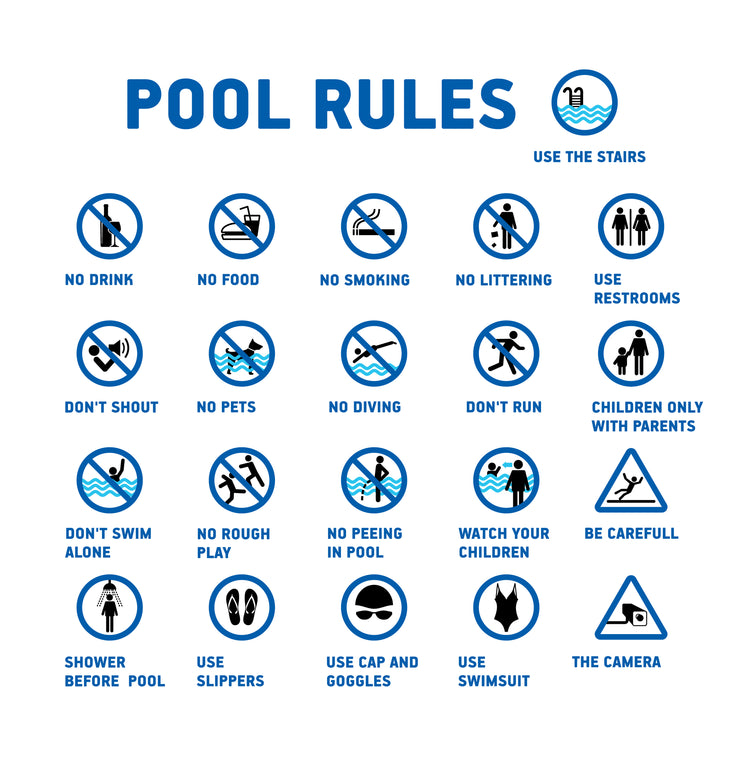Establishing Pool Rules: Building a Foundation for Safe and Enjoyable Swimming

Swimming pools are synonymous with fun, relaxation, and family gatherings. However, amidst the splashes and laughter, it's crucial to establish clear and concise pool rules to ensure the safety and well-being of all pool users. Whether you're a pool owner, a parent, or a guest, understanding and adhering to these rules is essential for creating a secure environment where everyone can enjoy the water safely. Let's dive into the importance of establishing pool rules and some key guidelines to consider.
Why Are Pool Rules Important?
-
Safety First: Pool rules prioritize safety above all else. By setting clear guidelines for pool usage, you can minimize the risk of accidents, injuries, and potential emergencies.
-
Prevention of Accidents: Accidents around pools can happen in the blink of an eye. Establishing rules helps prevent common accidents such as slips, falls, diving injuries, and drowning incidents.
-
Respect for Others: Pool rules promote respect and consideration for fellow swimmers, ensuring that everyone can enjoy the pool experience without disruption or discomfort.
-
Legal and Liability Protection: Implementing pool rules can help protect you legally in case of accidents or incidents. It demonstrates a proactive approach to safety and can mitigate liability in the event of a lawsuit.
Key Pool Rules to Consider
-
No Running: Running around the pool area increases the risk of slips, falls, and collisions. Enforce a strict "no running" policy to prevent accidents and maintain a safe environment.
-
No Diving in Shallow Areas: Diving should only be permitted in designated deep areas of the pool. Clearly mark shallow areas and prohibit diving to prevent head injuries and spinal cord trauma.
-
Supervision Requirements: Establish guidelines for adult supervision, especially when children are present. Designate a responsible adult as a "water watcher" to maintain constant vigilance over swimmers.
-
No Glass Containers: Glass containers pose a significant safety hazard in pool areas. Prohibit the use of glassware to prevent breakage and the risk of injury from shattered glass.
-
Respect for Pool Equipment: Encourage users to handle pool equipment (such as ladders, diving boards, and pool toys) with care and to avoid rough or reckless behavior that could damage or malfunction equipment.
-
Proper Attire: Establish guidelines for appropriate swimwear to ensure the safety and comfort of all pool users. Prohibit clothing with loose strings or straps that could pose entrapment hazards in pool drains or equipment.
-
No Horseplay: Discourage roughhousing, pushing, or dunking in the pool to prevent injuries and maintain a peaceful atmosphere. Emphasize the importance of respecting others' boundaries and personal space.
-
Shower Before Entering: Encourage pool users to rinse off in a shower before entering the pool to remove oils, lotions, and contaminants that can affect water quality and clarity.
-
No Food or Drinks in the Pool: Eating or drinking while in the pool can lead to choking hazards and water contamination. Establish designated areas for consuming food and beverages away from the poolside.
-
Follow Posted Guidelines: Display pool rules prominently in the pool area and ensure that all users are aware of and comply with them. Regularly reinforce these rules through signage, verbal reminders, and educational materials.
Conclusion: A Safe and Enjoyable Pool Experience
Establishing pool rules is not about restricting fun but rather about ensuring a safe and enjoyable swimming environment for everyone. By clearly communicating expectations, promoting responsible behavior, and prioritizing safety, you can create a welcoming pool atmosphere where families and friends can create lasting memories while staying safe. So, the next time you're by the poolside, remember to follow the rules and make safety a priority for all.


